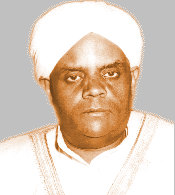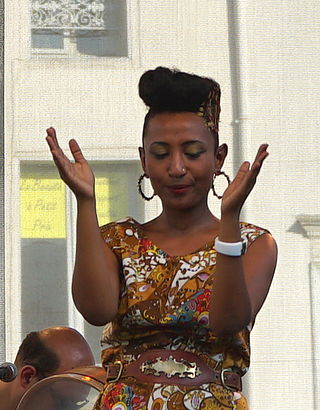Related Research Articles

Khartoum or Khartum is the capital of Sudan. With a population of 6,344,348, Khartoum's metropolitan area is the largest in Sudan.

Sudan, officially the Republic of the Sudan, is a country in Northeast Africa. It borders the Central African Republic to the southwest, Chad to the west, Libya to the northwest, Egypt to the north, the Red Sea to the east, Eritrea and Ethiopia to the southeast, and South Sudan to the south. Sudan has a population of 50 million people as of 2024 and occupies 1,886,068 square kilometres, making it Africa's third-largest country by area and the third-largest by area in the Arab League. It was the largest country by area in Africa and the Arab League until the secession of South Sudan in 2011; since then both titles have been held by Algeria. Sudan's capital and most populous city is Khartoum.

The rich and varied music of Sudan has traditional, rural, northeastern African roots and also shows Arabic, Western or other African influences, especially on the popular urban music from the early 20th century onwards. Since the establishment of big cities like Khartoum as melting pots for people of diverse backgrounds, their cultural heritage and tastes have shaped numerous forms of modern popular music. In the globalized world of today, the creation and consumption of music through satellite TV or on the Internet is a driving force for cultural change in Sudan, popular with local audiences as well as with Sudanese living abroad.

The current flag of Sudan was adopted on 20 May 1970 and consists of a horizontal red-white-black tricolour with a green triangle at the hoist. The flag is based on the Arab Liberation Flag of the Egyptian Revolution of 1952, as are the flags of Egypt, Iraq, Syria, Yemen, and Palestine and formerly of the United Arab Republic, North Yemen, South Yemen, and the Libyan Arab Republic.

Slavery in Sudan began in ancient times, and had a resurgence during the Second Sudanese Civil War (1983–2005). During the Trans-Saharan slave trade, many Nilotic peoples from the lower Nile Valley were purchased as slaves and brought to work elsewhere in North Africa and the Orient by Nubians, Egyptians, Berbers and Arabs.

In January 1899, an Anglo-Egyptian agreement restored Egyptian rule in Sudan but as part of a condominium, or joint authority, exercised by the United Kingdom and Egypt. The agreement designated territory south of the twenty-second parallel as Anglo-Egyptian Sudan. Although it emphasized Egypt's indebtedness to Britain for its participation in the reconquest, the agreement failed to clarify the juridical relationship between the two condominium powers in Sudan or to provide a legal basis for continued British governing of the territory on behalf of the Khedive. Article II of the agreement specified that
the supreme military and civil command in Sudan shall be vested in one officer, termed the Governor-General of Sudan. He shall be appointed by Khedival Decree on the recommendation of Her Britannic Majesty's Government and shall be removed only by Khedival Decree with the consent of Her Britannic Majesty's Government.
Sudanese literature consists of both oral as well as written works of fiction and nonfiction that were created during the cultural history of today's Republic of the Sudan. This includes the territory of what was once Anglo-Egyptian Sudan, the independent country's history since 1956 as well as its changing geographical scope in the 21st century.

Ahmad Ali Al-Mirghani was a Sudanese politician who served as the third President of Sudan from 1986 to 1989, when the democratically elected government was overthrown by a military coup led by Omar al-Bashir.

The National Museum of Sudan or Sudan National Museum, abbreviated SNM, is a two-story building, constructed in 1955 and established as national museum in 1971.

Contact between Egypt and Sudan goes back to trade and conflict during ancient times. In 1820, the British conquered Sudan after they had conquered Egypt, and the Egyptians entered Sudan through the British as officials, but they did not have any authority over Sudan. The British continued to occupy the country until Sudan declared independence in 1956. Sudan later joined the Arab League, of which Egypt is a founding member. Relations between successive governments in Egypt and Sudan have warmed and cooled at various times. Relations today are cordial, but tensions remain.

The 2011–2013 protests in Sudan began in January 2011 as part of the Arab Spring regional protest movement. Unlike in other Arab countries, popular uprisings in Sudan had succeeded in toppling the government prior to the Arab Spring in 1964 and 1985. Demonstrations in Sudan however were less common throughout the summer of 2011, during which South Sudan seceded from Sudan, but resumed in force later that year and again in June 2012, shortly after the government passed its much criticized austerity plan.

Hind Meddeb is a French journalist and documentary film director. Based in Paris, she works both in Europe, North Africa and the Middle East. In her films and journalistic writing, she has presented social protests of young people and their culture in Morocco, Tunisia and Egypt. Documenting their social situation and political expressions in the context of the Arab revolutions, she has further focussed on rap music or other kinds of counter-culture and protest in these countries.

Alsarah, born Sarah Mohamed Abunama-Elgadi, is a Sudanese-American singer, songwriter, and ethnomusicologist. She is the leader of the group Alsarah & the Nubatones, and has performed with other groups such as The Nile Project. Her stage name is a combination of her given name with the Arabic definite article.

Abdel Fattah al-Burhan Abdelrahman al-Burhan is a Sudanese army general who is the de facto ruler of Sudan. Following the Sudanese Revolution in April 2019, he was handed control of the military junta, the Transitional Military Council, a day after it was formed, due to protesters' dissatisfaction with the establishment ties of initial leader Ahmed Awad Ibn Auf. He served as chairman of the TMC until a draft constitutional declaration signed with civilians went into effect on the 17th of August and a collective head of state Transitional Sovereignty Council was formed, also to be initially headed by al-Burhan.
The 2019–2022 Sudanese protests were street protests in Sudan which began in mid-September 2019, during Sudan's transition to democracy, about issues which included the nomination of a new Chief Justice and Attorney General, the killing of civilians by the Rapid Support Forces (RSF), the toxic effects of cyanide and mercury from gold mining in Northern state and South Kordofan, opposition to a state governor in el-Gadarif and to show trials of Sudanese Professionals Association (SPA) coordinators, and advocating the dismissal of previous-government officials in Red Sea, White Nile, and South Darfur. The protests follow the Sudanese Revolution's street protests and civil disobedience of the early September 2019 transfer of executive power to the country's Sovereignty Council, civilian prime minister Abdalla Hamdok, and his cabinet of ministers. Hamdok described the 39-month transition period as defined by the aims of the revolution.
Cinema of Sudan refers to both the history and present of the making or screening of films in cinemas or film festivals, as well as to the persons involved in this form of audiovisual culture of the Sudan and its history from the late nineteenth century onwards. It began with cinematography during the British colonial presence in 1897 and developed along with advances in film technology during the twentieth century.
Stella Gaitano is a literary writer, activist and former pharmacist from South Sudan. She is known for her stories, often dealing with the harsh living conditions of people from southern Sudan, who have endured discrimination and military dictatorship, war and displacement in the northern part of Sudan. Since the independence of South Sudan in 2011, she has also published short stories about life in her new nation.

Khartoum Offside is a 2019 Sudanese sports documentary film with a focus on young women in Sudan, produced, written and directed by Sudanese filmmaker Marwa Zein. It was globally premiered in the 2019 Berlinale Forum in Germany and is one of the three notable Sudanese films of 2019.

The visual arts of Sudan encompass the historical and contemporary production of objects made by the inhabitants of today's Republic of the Sudan and specific to their respective cultures. This encompasses objects from cultural traditions of the region in North-East Africa historically referred to as the Sudan, including the southern regions that became independent as South Sudan in 2011.
Dorothy Griselda El TayibMBE was a British-born visual artist and cultural anthropologist, who was mainly known for her pioneering research on the traditional costumes as they reflect the culture and society of Sudan since the 1970s. She published her research in 2017 in the illustrated book Regional Folk Costumes of the Sudan.
References
- 1 2 3 4 5 Chokrane, Boutayna (2023-07-12). "Nadine El Roubi Defies Afro-Arab Taboos, One Freestyle At A Time". Rolling Stone. Retrieved 2024-09-16.
- 1 2 Hajjar, Danny (July 29, 2022). "Catching a vibe: Nadine El Roubi's artistry is as elegant as it is enigmatic". The New Arab.
- ↑ Atallah, Nasri (2022-09-05). "Nadine El Roubi is ready for your attention". Esquire Middle East. Retrieved 2024-09-16.
- 1 2 Attia, Rana (2022-07-15). "Nadine El Roubi, Reinventing The Arab Rap Scene, One Verse At A Time". Scoop Empire. Retrieved 2024-09-16.
- ↑ Wagner, Amuna (June 14, 2024). "Nadine El Roubi is at Her Most Confident and Vulnerable in 'Freestyles Pt. 2 Mixtape'". okayafrica. Retrieved 2024-09-16.
- 1 2 Chokrane, Boutayna (2024-04-30). "Rapper Nadine El Roubi on the Afro-Arab Storytellers That Inspire Her". Condé Nast Traveler. Retrieved 2024-09-16.
- ↑ Ali, Hiba (2024-07-16). "Nadine El Roubi to Perform at Sudan Fundraiser". GQ Middle East. Retrieved 2024-09-16.